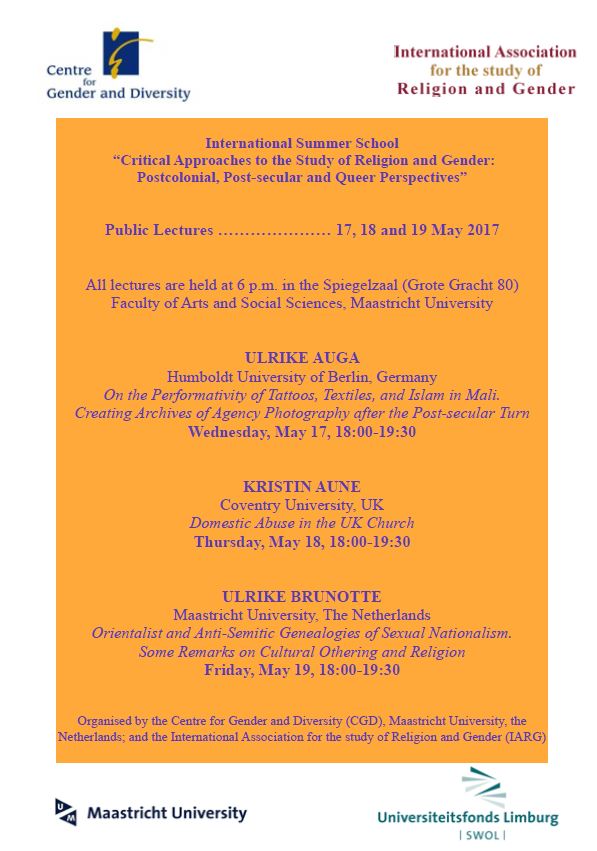International Summer School 2017
In contemporary multicultural societies, religious subjectivities, conflicts and contestations often focus on the themes of sexual difference, gender and sexuality. It is evident that in our postcolonial world and in (post)secular ‘Western’ as well as in ‘Non-Western’ societies, the confrontations, profiling and ‘identity’ politics of, and over and against religion[s] are often shaped by issues directly related to gender and sexuality (e.g. the recurrent heated debates over women’s veiling, abortion, or homosexuality). The expanding academic field of religion and gender provides critical tools to analyse these issues, and we wish to continue developing critical approaches to the study of religion and gender in the upcoming IARG advanced summer school.
In order to break new grounds in the understanding of these complex dynamics of religion and gender in our contemporary world, this advanced summer school explores the current major challenges to the study of religion and gender by focusing on three contemporary critical perspectives in the humanities: postcolonial, post-secular and queer theory (cf. Auga, et al. 2014). The CGD and IARG invite junior researchers (advanced MA students, PhD candidates, and postdocs) and other interested scholars to participate in the summer school. The summer school is aimed at students and scholars whose research is situated in the interdisciplinary study of religion and gender and who seek to incorporate critical theory in their projects. We encourage an interdisciplinary approach, welcoming scholars from, amongst others, gender studies, men and masculinity studies, disability studies, theology, religious studies, anthropology, history, literature, cultural studies and media studies.
The summer school strives towards integrating postcolonial, post-secular and queer theory, culminating in innovative and critical research questions and methodologies in the study of religion and gender. The three perspectives refer to three major social changes which have an impact on the contemporary representation, role and practice of religion and gender, as well as the academic reflection thereof.
- Postcolonial as well as decolonial theories aim to challenge and deconstruct ‘Western’ dominant models of knowledge, also in the study of religion and gender (for example critiquing binaries like ‘West’/’East’, enlightened/backward and sacred/secular). It seeks to unmask colonial epistemological frameworks, unravel Eurocentric logics, and interrogate stereotypical cultural representations (cf. Keller et al. 2004, Pui-lan 2005). It pays attention to different experiences of people across geographical, ethnic, racial, religious and sexual diffractions and performances.
- From a post-secular perspective, the secularisation thesis, stating that religion is in decline or even that it is bound to disappear completely, is being questioned and criticised. It deconstructs gendered and sexual constructions of religious-secular binaries, for example through studying new spirituality or critically debating the conceptions of religious agency that have been produced within secular gender theory (cf. Aune et al. 2008, Braidotti 2008, Bracke 2008).
- In queer theory, the entanglement of religion, gender and sexuality is studied beyond heteronormative schemes. It is sensitive to the ways in which religions in the context of postcolonial and post-secular societies can be constitutive of heteronormative religious subjectivities, but can also be a source of rituals, practices and discourses that challenge heteronormativity. Therefore, they can be creatively employed to imagine religious subjectivities outside of heteronormative frames (cf. Althaus-Reid 2003, Tonstad 2015, Wilcox 2013).
This summer school provides an advanced programme consisting of keynote lectures and intensive masterclasses guided by scholars in the field of religion, gender and sexuality. Confirmed lecturers are prof. dr. Ulrike Auga (Humboldt University), dr. Kristin Aune (Coventry University) and dr. Lana Sirri (Maastricht University). It brings together leading scholars from internationally renowned research institutions with junior researchers from a variety of global and national contexts. This set-up enriches the understanding of the participants of new critical developments in the field of religion and gender, and enables an in-depth theoretical exploration of their individual research projects. In addition, the summer school will offer workshops on writing, on integrating theory and data, as well as peer-sessions on the process of a PhD-project or publishing. Furthermore, it provides opportunities for future collaborations and building up an international network. The summer school aims at circa 20 participants.
More information on application and preliminary programme
Email address for questions: conference@religionandgender.org
